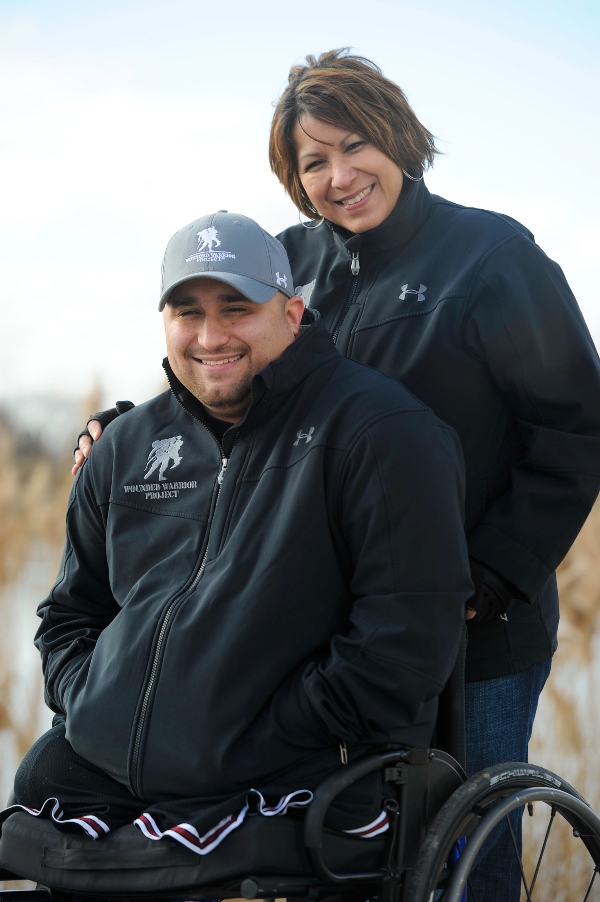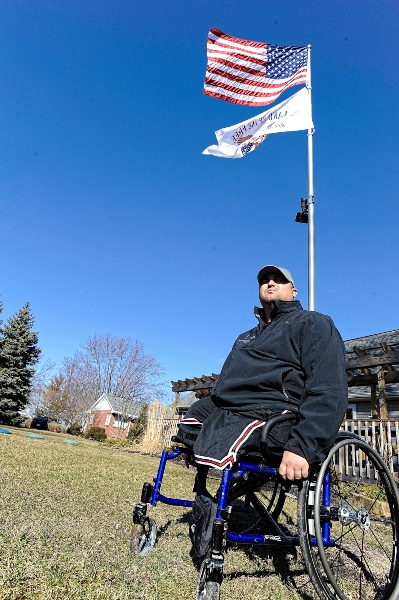How a Son’s Service Made One Mom Stronger

Most parents will tell you they have an unparalleled bond with their children. Cindy Parsons’ bond with her son Shane has been tried and tested.
In 2006, Cindy received a phone call that no parent ever wants to receive. Her only child, who enlisted in the Army right after high school, had been severely wounded in Iraq.
Shane had volunteered to drive lead Humvee on his day off. On the way back to his unit’s base, a powerful improvised explosive device (IED) detonated as the Humvee drove over.
Shane’s left leg was immediately severed, and his right leg had to be amputated because of lack of blood flow. Shane almost bled to death and went into cardiac arrest multiple times. The reduced blood flow also caused traumatic brain injury (TBI). The gunner seated next to him lost a leg in the blast.
It was Saturday morning in Ohio when Cindy got the call. She had just returned home from working at the local community hospital. She fought hard to get the job, going back to school as a single mom to complete a nursing degree.
The voice on the phone explained the Army was ready to fly Cindy to Landstuhl, Germany, to be with Shane. She didn’t know how bad things were, or if she would get to bring him back home.
But the day Cindy got that call, she told her boss without hesitation, “My son needs me.”
A Mother’s Love
Cindy left her career as a registered nurse to be at Shane’s side. She soon saw firsthand that in addition to the severe injuries that led to amputation of both legs, Shane’s brain swelling and TBI had complicated his recovery.
“When I walked into that room to meet him in Landstuhl, Germany, I thought I had prepared myself, but as someone who cares for the ill, it was so difficult to see a tube protruding from his brain,” Cindy said.
Shane fought hard and survived a difficult transfer to Walter Reed Army Medical Center, then located in Washington, D.C.
“When he finally woke up, he didn’t know anyone,” Cindy recalled. “Because of the brain swelling and the severity of the injury, it would take years of rehabilitation.”
Shane had to relearn daily active living skills, such as how to use a toothbrush and comb his hair, as well as use a manual wheelchair. He depended on Cindy for his physical and emotional well-being. She was unflinching in her dedication to her son. Cindy had promised her late husband, who passed from brain cancer when Shane was only six months old, that she would take care of their son.
She remembered that two people came in the hospital room at Walter Reed, respectfully addressed Shane regardless of his ability to verbally respond at that moment, and then turned to Cindy and said, “We’re here for you and your son.” They left a backpack with the Wounded Warrior Project® (WWP) logo.
When Shane finally came home, Cindy did everything she could to care for his physical and emotional wounds. But she wondered if her athletic son would fall into depression.
“We lived in a small community, so I was worried about finding resources,” Cindy said. She connected with WWP and learned about its Independence Program and how it could help Shane. “They came in and sat down and asked Shane, ‘What would you like to do?’”
With help from WWP’s Independence program, Shane found ways to create a new life. “Shane was able to build the self-confidence he so badly wanted to regain,” Cindy recalled. “He participated in Soldier Ride® and many other events with fellow veterans. He ended up coaching junior high and high school football in our community.”
Now it is Mom’s Turn
For Cindy, it was a moment of pride and admiration for her son’s accomplishments — her sacrifices paid off. But what was next for her?
“For me, as his mom, and after leaving my career, Wounded Warrior Project stepped in and said, ‘We would like you to tell your story,’ and that literally changed my life,” Cindy said.
Cindy is now part of Warriors Speak®, a group of veterans and caregivers who advocate for injured veterans by sharing their stories and spreading the word about how WWP helps.
Cindy pulls from resilience she developed throughout her life. Even before Shane was born, she was overcoming obstacles and reinventing herself. Cindy was there for her mom and siblings when their dad died tragically after a gas explosion at home. She was a senior in high school, and the experience prompted her decision to become a nurse.
She took a detour from school to help support her family through a job in retail management, and she eventually met her late husband, Rick. After he passed, Cindy worked in a semiconductor factory until Shane was older and she could go back to school. She quit that job and the security that came with it and took a chance working for the local college to help pay tuition. She was finally on her way to fulfilling her dream of becoming a nurse.
Then, the events of September 11, 2001, happened. Shane was a junior in high school. Cindy was studying hard to finish her nursing degree.
Five years later, she finished her degree and had recently attained a coveted shift as an ER nurse at a community hospital when she received that life-changing phone call. But giving up nursing was not the hardest part.
“The hardest thing for a parent is to see your strong and healthy son like that,” Cindy said. “When the actual trauma hits you, you are lost.”
Lessons from The Edge of Parenting
Fortunately, Cindy found her way. She quickly learned to watch, listen, and ask questions of the care providers.

As a nurse, Cindy understood the severity of the injuries and the importance of decisions. She vowed to become a good advocate. “I asked the tough questions, and I kept good notes.”
Cindy now shares her knowledge with other caregivers who might be in similar situations. She also advocated for military families on Capitol Hill. “Wounded Warrior Project showed me that I can make a difference.”
Cindy urged Congress to pass the Caregiver and Veteran Omnibus Health Service Act of 2010 — a bill providing support for caregivers of injured servicemen and women.
Cindy has also learned to advocate for herself — seeking out other caregivers she met through WWP and offering support and mutual inspiration. Still, her biggest joy comes from her family.
“Shane is the epitome of someone so young, who went through life-altering changes, who can show you humanity and what it means to never give up.
“And something wonderful happened at one of the Wounded Warrior Project events: he met a young lady — something he thought would never happen. He didn’t think anybody would love him, as he would say, ‘I’m half a man.’”
Shane is now married and has a son. Cindy is quick to point proudly at family pictures adorning the walls of her home. She is thrilled about the new life Shane is building, and grateful for her daughter-in-law, Jennifer. “She is a wonderful mother, wife, and strong caregiver for Shane.”
Today, Cindy’s joy comes from a beautiful multigenerational family: from her 85-year-old mom to her 3-year-old grandson. She currently has four generations living in her house — for now at least — while Shane and his young family find a new home close to Cindy.
“I get the memories of time spent with my family, and seeing my son be a good father.”
Contact: Raquel Rivas — Public Relations, rrivas@woundedwarriorproject.org, 904.426.9783
About Wounded Warrior Project
Since 2003, Wounded Warrior Project® (WWP) has been meeting the growing needs of warriors, their families, and caregivers — helping them achieve their highest ambition. Learn more.